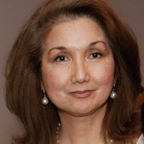
How would you feel if someone reminded you over and over about a sad time in your life you yourself would rather forget?
Not so good, that’s for sure.
Most people would prefer to put the matter behind them, especially if they continue to suffer the effects of the tragedy. Those who have healed and been transformed might use that misfortune to inspire them to greater heights. Overcoming tragedy is a long process that's never easy.
Having been abandoned by your birth parents is the kind of beginning better left in the past, even if the site they had chosen to leave you was a church and the ensuing consequences paved a life of privilege for you. (WATCH: Grace Poe cries as she talks about her parents, adoption)
It’s one thing to have been left unprotected to the elements and it’s another to be swaddled and placed at a sacred space in hopes of discovery by strangers who will care for you no less than if you were the product of their union. Either way, however, being reminded that your parents gave you up hurts.
Why, then, should Philippine Senator Grace Poe constantly be referred to as a “foundling?"
It’s bad enough that she is constantly described as an “adopted” child but to keep emphasizing the circumstances that united her and her parents is beyond my comprehension.
I’m appalled by my colleagues in the Philippines who fire the term repeatedly, apparently giving little thought to its meaning.
OK, so there’s a Foundling Museum in London, repository of relics from the eponymous hospital established in the 1800s for "the maintenance and education of exposed and deserted young children." The name has since been dropped and the hospital trust replaced by the Coram Family Foundation.
But even then, the term connoted immorality because the referenced children often were born of infidelity or prostitution.
Poe’s biological parentage is none of others' business, but her enemies refuse to let the matter rest.
Why can't they recognize Philippine film icons Susan Roces and the late Fernando Poe Jr as her parents? Must they keep calling them her "adoptive" parents 40-some years later?
I met the then-adolescent future legislator and the movie star at a photo shoot decades ago at their home in Greenhills, San Juan, and saw more affection between the two than I've witnessed in other families. They are mother and daughter.
Poe's enemies today can’t seem to dig up dirt on her so they nag about her origin as if her biological parents' actions makes her less deserving of public trust.
The term they use always bore a negative connotation. It's almost synonymous to unwanted, discarded, unacceptable, impostor. It is beyond unnecessary: It is intrusive and derogatory.
I can see why Poe's political rivals insist on using it but seeing it in news reports gives me pause.
Is it novel and does its "newness" outweigh its offensiveness?
Perhaps usage in a country where English is not the first language mitigates its impact? For the same reason that the English slang for feces and fornication spout so freely where the Tagalog version never sees print or space?
Would editors delete "napulot" or the Tagalog translation if the article were in Filipino?
The term is archaic. It's not even found in the AP Style Book and Libel Manual, the journalism bible.
AP, the world's largest news-service organization whose style guide is universally adopted, dropped use of "Oriental" to describe people from Asia because of the negative stereotypes attached to the term in the United States. Early in the previous century, the term "Oriental" connoted strange, sly. and dirty. AP sanctions the term today to describe objects ("oriental rugs") but not people.
In 2013, AP stopped sanctioning use of "illegal immigrant" and "undocumented immigrant" in reference to those residing in the United States without appropriate or legal authorization. AP allows use of "illegal" for the action (as in illegal immigration)but not for persons.
Similarly AP also dropped the use of "schizophrenic" and other psychiatry-related terms for people with the condition. The organization sanctions "people with schizophrenia" instead.
The idea is to end the use of labels.
“We’re trying to put the emphasis not on describing people but on describing actions or situations that they are in,” AP standards editor Tom Kent explained to TIME.
The ban on the old terms “fits in with our own ethic on labeling,” Kent said. “We want to some degree reflect the evolution of society.”
Here's a challenge to my colleagues in Manila: Let's evolve together. – Rappler.com
Cherie M Querol Moreno is a keen observer of the evolving Filipino American community in the San Francisco Bay Area, subject of her 30 years of reporting for and editing Filipino-American publications. She founded and directs the family violence prevention nonprofit ALLICE Alliance for Community Empowerment and sits on the San Mateo County Commission on Aging. 'Unbound' is her long-running column which will now be published regularly on Rappler.